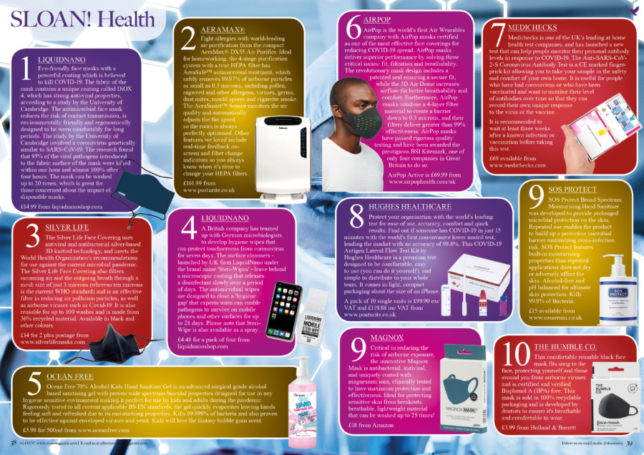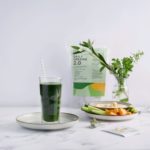
The Superfoods Company
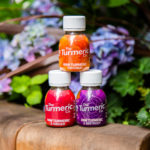
The Turmeric Co.
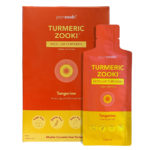
Zooki
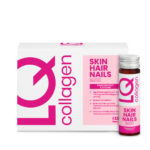
LQ Collagen
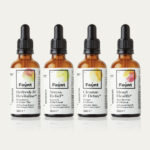
Fount

Nexba
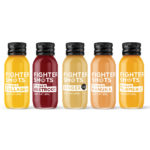
Fighter Shots
The research, presented at the European Federation of Food Science and Technology (EFFoST), was carried out by Tracklements in association with Cardiff Metropolitan University. The results show that 86% of participants in the study saw a significant drop in their blood glucose and/or cholesterol over a 12-week period.
The research findings are based on 42 volunteers who took part in the trial, all of whom were aged between 40 and 70 years old and were overweight or clinically obese. The participants ate a heaped teaspoon of wholegrain mustard daily for 12 weeks. Their blood glucose and cholesterol levels were measured prior to the study, and again at weeks 2 and 12.
This is great news for the UK. If the findings are extrapolated across the general population where approximately 7 million people are believed to be pre-diabetic, this would indicate somewhere in the region of 525,000 people could be helped simply by enjoying a heaped teaspoon of wholegrain mustard every day.
When it comes to the benefits of wholegrain mustard on cholesterol, the research identified that 64% of volunteers saw a drop in their blood cholesterol levels over the 12 weeks, and with an average decrease of 10% in blood cholesterol levels across the sample group, it indicates a promising downward trend for those at a greater risk of developing heart disease, stroke and vascular dementia. This is the same sort of cholesterol reduction seen when following a low-fat diet.
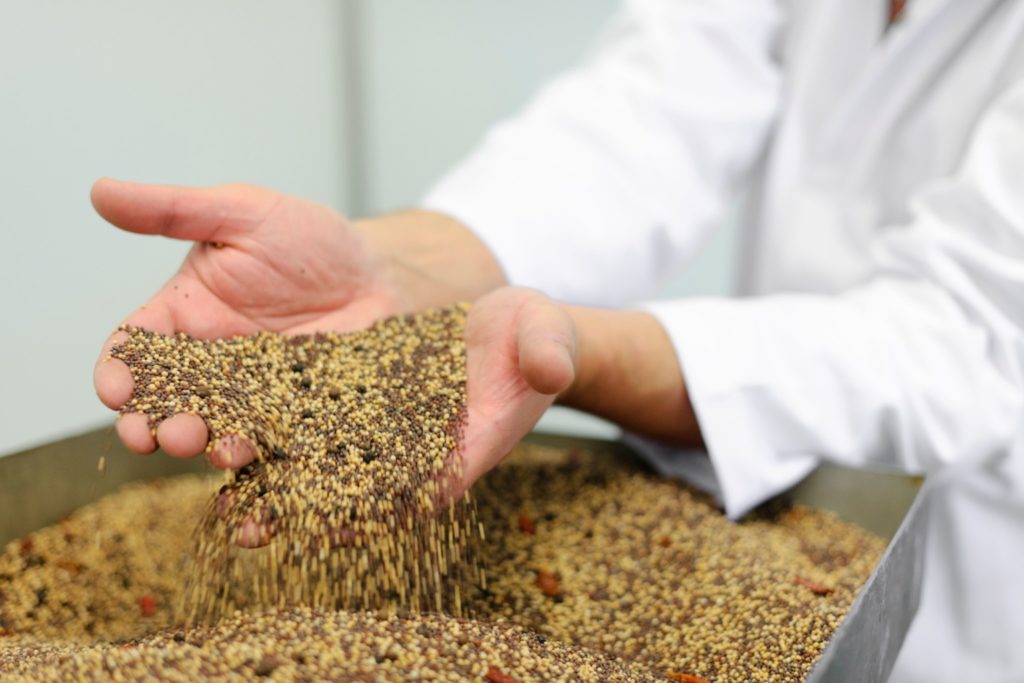
But heart health isn’t the only reason to serve up this brilliantly versatile condiment. Mustard has been used to liven up food throughout history, there are references to it in ancient Egyptian, Greek and Roman texts.
Mustard seed was introduced to the UK by the Romans. Cherished by them for its medicinal qualities as well as for its ability to make unappetising meat palatable, no self-respecting Roman travelled without a pouch of mustard seed to plant. The Romans would grind the mustard seed by crushing it and mixing it with Verjuice or Grape Must (Mustum). They called the resultant paste Mustum Ardens – meaning “Fiery Must” which is how we get the word “Mustard”. However, wholegrain mustard completely disappeared in Britain after mustard flour gained popularity in the 18th century until Tracklements launched the first wholegrain mustard in 1970. Since then wholegrain mustard has enjoyed a robust revival, proving itself a must-have staple of the larder and the table.
Tracklements wholegrain mustards are very similar to those Roman forerunners. 100% natural, the health benefits highlighted by this research are due to the naturally present compounds and there are no additives or preservatives used. As with all their products, Tracklements make their mustard by hand, using only the very finest ingredients. The yellow mustard seed is grown in East Anglia the brown seed comes from Canada, both are ground in traditional stone grinders before being mixed with the very best apple cider vinegar from Suffolk and left to mature in barrels for up to five days for a gloriously rounded flavour.
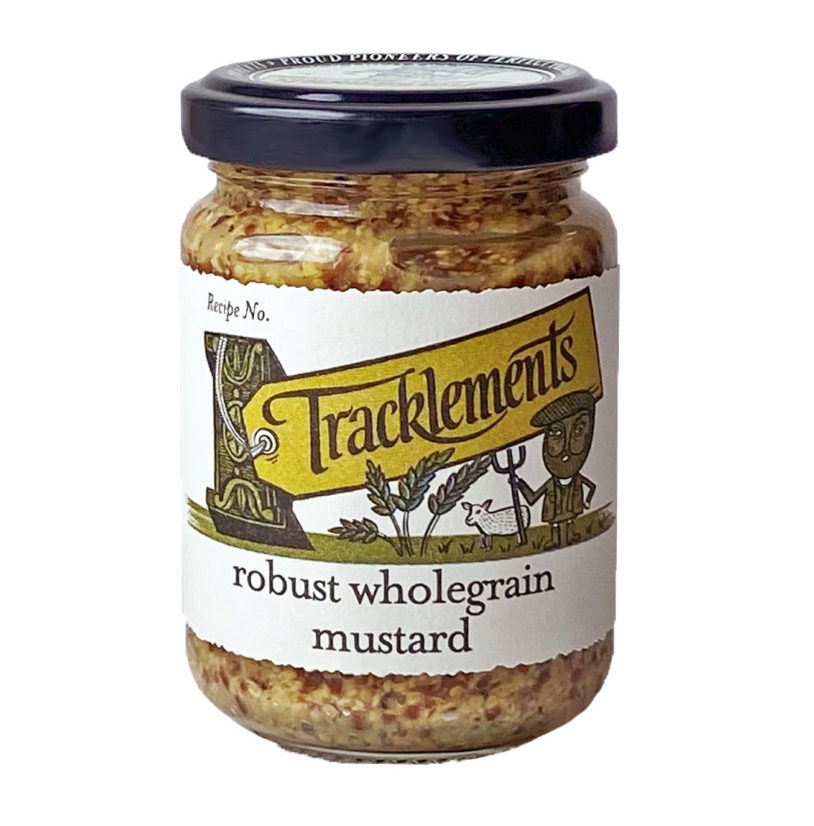
Here are some easy ways to get your daily heaped teaspoon of Wholegrain Mustard into your diet:
- In mayonnaise, hollandaise, vinaigrette and béchamel sauce
- Stirred into Gravy (and onion gravy)
- Potatoes (mashed, boiled, baked or new potato salad)
- Stirred through creme fraiche or yoghurt to be mixed through raw, julienned celeriac
- With fried mushrooms
- Spread on a crouton for a soup or a stew
- With smashed avocado and poached egg
- In cheese sauce
- On Croque Monsieur
- In scrambled eggs
- With any roast meat
- A glaze for carrots and parsnips
- On fish (mackerel or halibut)
- On Welsh Rarebit
- In Yorkshire pudding batter
- In cheese straws
- In devilled eggs
- In mac ‘n’ cheese
- In sausage rolls
- In any sandwich, but particularly Ham, Cheese or Sausage
Tracklements Robust Wholegrain Mustard is £2.35 available from fine food delis and farm shops nationwide and online at www.tracklements.co.uk
]]>Posted via Royal Mail, results are available within two to three days, and can help people to ‘know their number’ by identifying a figure on a scale of 0.4 to 2500 U/mL (units per millilitre). A score of below 0.8 means no antibodies were detected; anything above this shows the presence of antibodies to the virus. The duration and effect of these antibodies in giving immunity to the virus is still being established.
It means individuals can monitor their personal antibody levels, paving the way for better intelligence on immune response among different people. As more research is completed this may prove useful when it comes to everyday activities and occasions – such as booking overseas travel, spending time with vulnerable friends and family, or returning to work and hospitality settings. The test can be taken at three-to-four-month intervals, to measure variation.
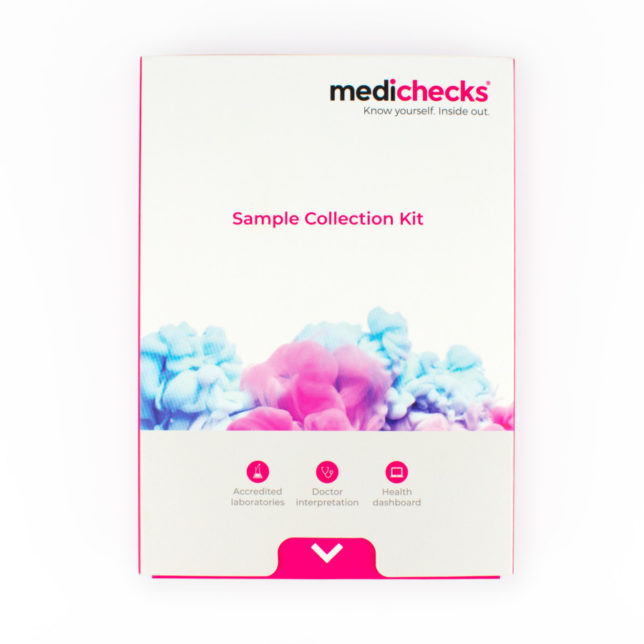
Dr Sam Rodgers is Chief Medical Officer at Medichecks, the UK’s longest-standing online consumer blood testing provider. He explains: “What is being learnt about COVID-19’s impact on the immune system is still a moving target, but this test lets people monitor their antibody levels over time. It is not yet known how long immunity, once it has developed, will fade, what level of antibodies provides immunity to coronavirus or at what level re-vaccination will be needed.
“It is also a focus of ongoing study whether antibodies may drop more quickly in certain groups of people, or if a COVID-19 infection generates more or less antibodies than the vaccine.
“We won’t completely rid the UK of COVID-19 anytime soon, but the more we can track antibody fluctuations in the UK population, the better picture we can build around how this virus can be managed long-term.”
The NHS Blood and Transplant Service (NHSBT) issued a plea for more male COVID survivors to donate plasma to its national treatment trial. Analysis by NHSBT found that 43% of male donors had high enough COVID antibodies for their plasma to be used to help patients hospitalized by the virus, compared to just 29% of women – a difference they described as ‘statistically significant’.
Dr Rodgers adds: “As a guide, NHSBT is targeting volunteers who have antibody levels higher than 62 (U/mL) to donate plasma to treat people who are seriously ill with coronavirus. This doesn’t mean that if you have lower levels than this you won’t be protected, as we don’t know at what level of antibodies protection occurs.
“A number of studies have shown that coronavirus antibodies remain in the blood for at least six to eight months for most people. For some, particularly those who had no symptoms, antibody levels may decline more quickly. With the Medichecks test, it will be possible to get a result below 0.8 (U/ml), even if you have had a coronavirus infection in the past. This could be because you only experienced mild or non-existent symptoms. It could also be because your body responded to the virus using different parts of your immune system.
“There is a higher chance of a negative result (below 0.8 U/ml) if the test is taken too soon after becoming infected with coronavirus or being vaccinated, so we recommend waiting at least three weeks after a known infection or vaccination before testing.”
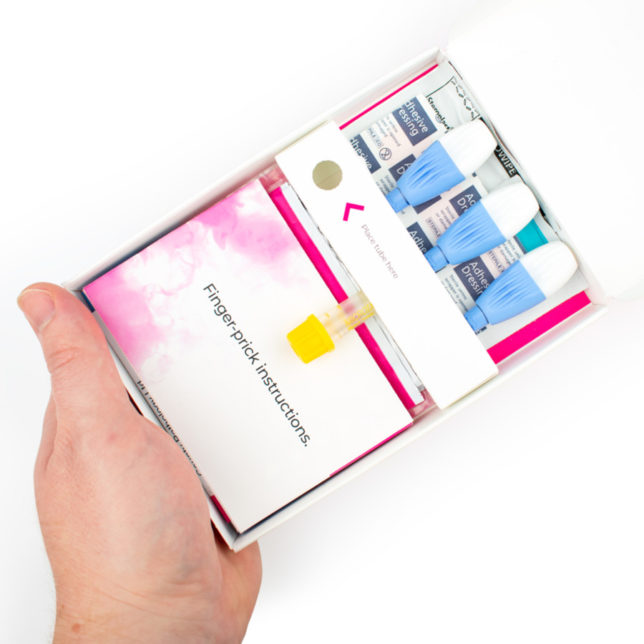
By taking this test, people can not only get a good understanding of their levels but their anonymised data can be used in the fight against the virus – helping shape a national picture on antibody fluctuations in the UK population.
Despite there being a few covid antibody tests on the market, what makes Medichecks different is that their test measures levels, not just whether antibodies are present or absent. Medichecks is the UK’s longest-standing online consumer blood testing provider. Priced competitively, Medichecks’ CE-marked finger-prick Anti-SARS-CoV-2-S coronavirus antibody test is manufactured by Roche who have undertaken rigorous sensitivity and specificity testing.
Test sensitivity is the ability of a test to correctly detect a positive result when testing samples from people known to have had a coronavirus infection. After 28 days, sensitivity is 100%, based on a study by test manufacturer Roche so we recommend taking the test 3-4 weeks after your vaccine or from when you traced that you had been infected with the COVID virus.
Test specificity is the ability of a test to correctly produce a negative result when testing samples from people known not to have had a coronavirus infection. Roche used 5,991 negative samples, with the test produced only one false-positive result – giving the test a specificity of 99.98%.
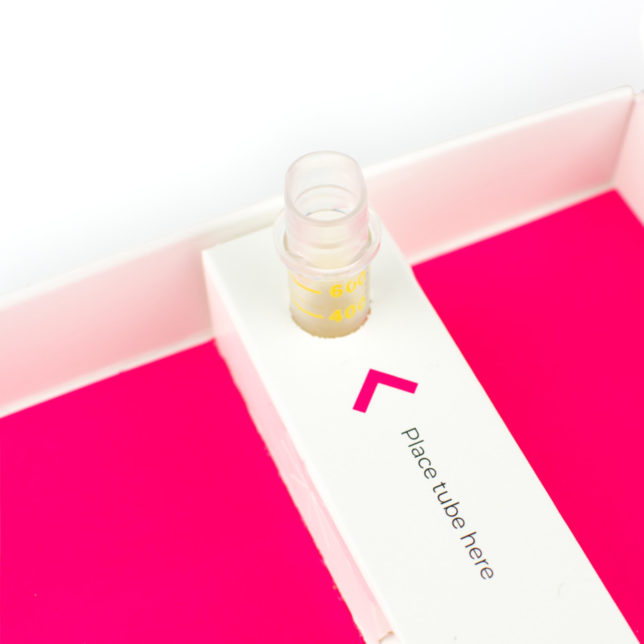
Medichecks posts a sample collection kit to customers together with full instructions on how to collect a blood sample in a small vial at home. When taking a finger-prick blood test, there are some things you should make sure you do to make sure you have a successful test. These are:
1. Hydrate Well
Make sure you are well hydrated before attempting to take your test, as this can affect your blood flow. We recommend drinking a large glass of water in the hour before you are planning to do the test.
2. Get Your Blood Flowing
It’s a good idea to increase your blood flow before a test. Activities such as taking a warm shower, moving gently with stretches or yoga, doing a quick burst of 10-star jumps or simply walking up and down the stairs a few times will help get the blood pumping making collecting the blood more successful.
3. Choose the Best Finger
We found that when collecting blood, it was best to prick the side of your ring finger on your non-dominant hand (which for most of us would be the left hand). It also is recommended to wash your hands in warm water and use the alcohol wipe included in your kit to clean your chosen finger immediately before collecting blood.
4. Gravity is Your Friend
When actually collecting blood, we found that best results were achieved by massaging the finger downwards towards the finger-prick site and letting gravity be your friend by standing up to help the blood flow smoothly into the vial. You may find you need to try a different finger to fill the vial with the required amount of blood. We found that in one case, three fingers had to be used to fill the vial however in another case, only one had to be used so this does vary.
Once the sample has been taken it is then posted to a UKAS accredited laboratory for analysis. The result, accompanied by a doctor’s interpretation, is uploaded to the customer’s online dashboard. A result which is less than 0.8 U/ml is negative for coronavirus antibodies. A result which is 0.8 U/ml or more is positive, and means that antibodies to coronavirus have been detected in your blood.
Our review panel results were between 1,384 U/mL and 194 U/mL. All participants had received the double jab of the Astra Zeneca vaccine at least 3 weeks before testing. In terms of qualitative results, the positive result for Anti-SARS-CoV-2-S antibodies is anything over 0.8 U/mL. So all of the panel tested positive using the Medichecks at-home testing kits.
At the moment we do not know what constitutes a high, low or average level of antibodies in the population. However, as a guide, NHS Blood and Transplant targeted people who had antibody levels higher than 62 U/ml to donate plasma to help in the treatment of people who are ill with coronavirus. This doesn’t mean that if you have lower levels than this you won’t be protected against coronavirus. However, we don’t know at what level of antibodies protection occurs. This test enables you to track your levels of antibodies over time, to see how quickly they decline after a positive coronavirus test or receiving the vaccine. Please note that some people do not develop antibodies even after a positive test for coronavirus. This may be because another part of their immune system e.g. their T-cells, successfully fought the virus. We also know that not everyone who has the vaccine will develop antibodies.
Manufactured by Roche, the Anti-SARS-CoV-2-S coronavirus antibody test is priced at £69 and is available to buy from medichecks.com/products/coronavirus-antibody-blood-test
Medichecks Anti-SARS-CoV-2-S coronavirus antibody test was also featured on page 39 of the 26th Edition of SLOAN!
]]>Microbial Jungle
Your gut is home to the most densely populated microbial environment in your body, known as the gut microbiome. In fact, there are more bacterial cells in your body than there are human cells, most of which are in your gut. Most of these gut microbes are actually extremely important for your health. For example, the human body doesn’t have the enzymes necessary to digest fibre, however your gut microbes do have these important enzymes. When they digest fibre, they produce important molecules such as short chain fatty acids which help to keep your gut healthy.
Immunity
Roughly 70% of your immune cells are located in your gut. These immune cells continuously check everything travelling through your gut (microbes, food and anything else) and then decide whether it is safe or whether the immune system needs to fight it and remove it from the body.
Links with Other Organs
Your gut is physically and biochemically connected to almost every other organ in your body. Immune cells, nutrients and drugs in your gut can move around your body to other organs through a variety of routes. Intriguingly, gut health is intricately connected with brain health, through a biological network known as the gut-brain axis, which is made up of trillions of nerves connecting your brain to your gut. The gut can send signals to the brain and vice versa, therefore stress or anxiety may trigger gut symptoms, whilst poor gut health may trigger stress and other mental health symptoms.
With all of this new science demonstrating the critical role your gut plays in your overall health, it is important to know how to keep your gut healthy.
Probiotics
Probiotics are live microbes that have a specific health benefit. Unfortunately, many live bacterial supplements marketed as probiotics do not have good scientific evidence for specific health benefits in humans. Furthermore, just like all of the other microbes in your gut, each individual probiotic has different functions, therefore not all probiotics are the same. A handful of probiotics, including Sons Probiotic supplement, have proven scientific evidence for improving gut health by reducing symptoms of bloating, abdominal pain and gas. Certain probiotics also can improve gut health in other specific circumstances such as reducing antibiotic-associated diarrhoea and traveller’s diarrhoea. Therefore, for people with symptoms of poor gut health, a probiotic supplement for ~8 weeks may improve gut health.
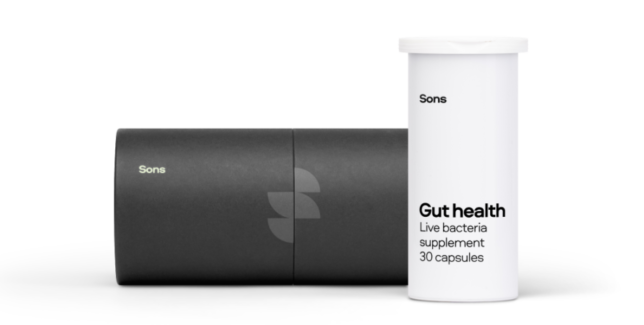
Diversity Your Diet
We are all guilty of eating the same meals every week, however, this may not be the best approach for your gut. As your gut contains thousands of different types of microbes, they all require many different types of food to stay health. That is why diet diversity is the best way to improve gut health. Your gut thrives on plant-based foods, as these contain fibre necessary to help your gut microbes to grow. Plant-based foods are any foods that don’t come from animals, and can include fruits, vegetables, nuts, seeds, grains, beans, herbs and spices. Here are a few tips:
- Every time you do your food shopping, buy a new plant-based food that you wouldn’t usually buy.
- Write down every plant-based food that you eat every day and try to work your way up to 30 different types each week.
- Fill a large jar with a variety of chopped nuts and seeds. You can then easily sprinkle these on your cereal, salad or meals to add a fibre boost for your gut.
- If cooking with red meat (lasagne, Bolognese, shepherds pie, stew), replace half, or even all, of the meat with tinned lentils to add to your gut-friendly fibre intake.
- Swap out ‘white’ versions of rice, pasta and bread with ‘brown’ versions, which contain much more gut-friendly fibre.
There are so many more grains available than rice and pasta. Most supermarkets these days have a whole shelf full of various grains beside the rice including quinoa, bulgur wheat, pearl barley and many others. Remember, spices can count in your 30 a week. Many spices are great foods for your gut microbes. Just like your fruit/vegetables, diversity is key. Make a collection of spices and experiment with different types in different meals.
Exercise
Exercise can significantly improve symptoms of poor gut health for a number of reasons. Exercise can help the muscles that support normal gut function. Regular exercise may also help to improve symptoms of gas and bloating. In fact, a recent study found that 2 sessions of yoga per week for 12 weeks was as effective at improving gut health symptoms as the best-known dietary treatment. Many other forms of exercise can also improve gut health symptoms, reduce gut inflammation and change the composition of the gut microbiome.
Tackle Those Gut Feelings
Exciting science is beginning to show various lifestyle changes that can help support the gut brain axis. Fascinating scientific studies show that mindfulness and cognitive behavioural therapy can significantly improve gut health by reducing symptoms of irritable bowel syndrome, such as bloating and abdominal pain. Therefore, integrating mindfulness into your lifestyle may have real impacts on gut health. On the other hand, certain gut-directed lifestyle changes may even improve mental health outcomes. Prebiotics are certain foods that support the growth of beneficial gut microbes. Prebiotics are often dietary fibres found in certain fruit, vegetables and other plant-based foods. Interesting studies have found that eating particular prebiotics can reduce levels of cortisol, the hormone that makes your feel stressed. Particular probiotics may also have similar effects. A small number of probiotic, live bacterial supplements have scientific evidence for reducing stress and anxiety, if consumed over a few weeks. Therefore, focussing holistically at all aspects of gut and brain health may have benefits for overall health and wellbeing.
About the expert
Dr. Ruairi Robertson is a leading gut health specialist & TEDx speaker. He obtained a B.Sc in Human Nutrition from University College Dublin, Ireland. He subsequently conducted a Ph.D in University College Cork within APC Microbiome Ireland studying the interaction between maternal and early-life dietary lipids, the developing microbiome and metabolic health outcomes.

During this time, he was awarded a Fulbright Scholarship to conduct part of his PhD research in Harvard University Medical School and Massachusetts General Hospital. In 2017 he was awarded a Sir Henry Wellcome Postdoctoral Fellowship from the Wellcome Trust to conduct research within the Centre for Genomics and Child Health in the Blizard Institute, Queen Mary University of London and the University of British Columbia, Canada.
]]>Eating more fruits and vegetables, alongside maintaining a healthy lifestyle, has been shown to reduce the risk of heart attacks, type 2 diabetes, obesity and certain types of cancer, to name a few major health concerns.
Dr. Naomi Newman-Beinart is a nutritionist (BSc) and specialist in health psychology (PhD) and she explains why finding ways to get more fruits and vegetables into men’s daily diets is essential for maintaining good health and wellbeing.

Dr. Naomi says, “A lack of fruits and vegetables in many men’s diets means that they are not getting enough of the essential nutrients, including vitamins, antioxidants and minerals, required to keep in top form, either mentally or physically, and this can lead to health complications later in life”.
Here are five top men’s wellbeing needs that can be helped by eating more fruit and veg:
Good Digestive Health
Fruits and vegetables are vital to keep your digestive system running smoothly – literally – fruits and veg contain lots of natural fibre which is a winning formula to ensure we avoid constipation and support a healthy digestive system. High fibre fruits and veg to enjoy include bananas, strawberries, oranges, artichokes and broccoli.
Healthy Heart
Cardiovascular disease is one of the top causes of death for men in the UK. Experts say that many cases of premature death from heart disease are preventable – so what better reason can there be to up your fruit and veg game?! Until recently, it’s been unclear which fruit and veg may be preferable to reduce the risk of heart disease. But last year, researchers in the US combined the results of many studies in this area and found that citrus and apples were the top fruits that showed the greatest benefits. Also, allium vegetables (e.g. garlic, onions and leeks), carrots, cruciferous and green leafy veg were the most beneficial vegetables to include in your diet with regards to heart health (2).
Healthy Joints
We don’t really think about our joints until they start to hurt, and only then do we realise that we should have been thinking about them before now! I always say that prevention is the best medicine and it’s never too early to take care of your joints. It’s hard to pick out specific fruit and veg that might aid in prevention of joint problems. Foods containing polyphenols, micronutrients that occur naturally in many plant foods, are antioxidants, anti-inflammatory and have pain-relieving effects for people with arthritic joint problems (3). Fruits including blueberries, strawberries, raspberries and pomegranates, were all found to reduce pain and inflammation of the joints.
Good Vision
Over the past 15 years or so, there has been a heap of scientific research showing that two specific carotenoids are essential for eye health. These are lutein and zeaxanthin and these remarkable nutrients are found in the part of the retina that protect your eyes from blue light (from your tablet, smartphone and laptop) and fight free radicals that could otherwise damage your eyes. Many fruits and vegetables contain lutein and zeaxanthin, including carrots, peppers, kiwi fruit, oranges and green, leafy vegetables. Researchers have analysed the amounts of lutein and zeaxanthin in different fruit and veg and concluded that a variety of different coloured fruit and veg is best to support optimal eye health (4).
Mental Wellness
If you ask anyone why it’s important to eat more fruit and veg, they are likely to focus on the physical health benefits and prevention of physical illnesses. But fruit and veg is not only important for physical health but is essential for mental wellbeing too. Recently, researchers studied the effects of fruit and vegetable intake on numerous aspects of mental wellbeing (5). They found that people who ate more fruit and veg were more likely to be optimistic and less likely to struggle with low mood and depression. My recommendation is to always try and eat a rainbow of fruit and veg throughout your week. That way you will get the benefits of a variety of vitamins, minerals and micronutrients that you need to support your mental health.
It’s pretty clear that eating more fruits and vegetables can boost men’s health, from mental wellbeing to physical health benefits. But, as a nutritionist working with patients, I often find men tell me that they haven’t got enough time to eat enough fruit and veg or it just gets left in the fridge and goes mouldy. Don’t let the idea of upping your fruit and veg stress you out.
Here are 5 man-friendly, simple ways to boost your fruit and veg intake:
1. Don’t overlook frozen fruit and veg as something easy to have in the freezer anytime you need it.
2. If you’re not one to have much fruit and veg at home, then a really simple and quick way to improve your diet is to have FOGA’s delicious freeze-dried instant fruit and veg Plantshakes. Bring a sachet out with you and shake up your preferred flavour with water. The great thing about FOGA’s shakes is that you don’t need a blender – you can use any bottle and just shake and go! You will then have a perfect smoothie that tastes exactly the same as if you’d used fresh fruit in a blender. FOGA’s Plantshakes contain freeze-dried fruit, which retains higher levels of nutrients than fruit and veg bought at the supermarkets – and they provide you with the equivalent of 160g of fresh fruit and veg, which is 2 of your 5 a day!
3. Either do some prep in advance if you can, or buy ready chopped veg as an easy option to add to stir-fries and curries – as long as your eating it, that is the main thing.
4. Pack fruit and veg snacks for when you’re on the go, rather than buying it while you’re out. If you have it with you, you are more likely to eat it as soon as you’re peckish.
5. Eat more soups! Soup is a great way to get more veg in your diet and most soups will contain at least 2 portions of vegetables in one serving. Soup is a clear winner for a starter when you’re out for lunch or dinner.
About the expert
Dr Naomi Newman-Beinart (PhD) is a Nutritionist and Specialist in Health Psychology. Dr Naomi is working on behalf of FOGA, whose delicious freeze-dried instant fruit and veg Plantshakes provide the equivalent of 160g of fresh fruit and veg, which is 2 of your 5 a day, plus by freeze-drying, they retain higher levels of nutrients than fruit and veg bought at the supermarkets.
- HSCIC Health Survey, 2019. http://healthsurvey.hscic.gov.uk/data-visualisation/data-visualisation/explore-the-trends/fruit-vegetables.aspx
- https://pubmed.ncbi.nlm.nih.gov/33000670/
- https://www.ncbi.nlm.nih.gov/pmc/articles/PMC5788027/
- https://www.ncbi.nlm.nih.gov/pmc/articles/PMC1722697/
- https://www.ncbi.nlm.nih.gov/pmc/articles/PMC7019743/
I founded Beder in November 2019 in memory of my younger brother, Beder Mirjan, who sadly took his own life at the age of 18 in April 2017. Beder has been set up as a family to do good in his name but it’s much more than a family charity – it is a platform for us all to play our part to normalise the conversation around these important issues.

I have always been involved in fundraising whether through running marathons or organising events to support causes close to my heart but, when we lost my brother, it was clear my focus would be on mental health and suicide prevention.
I am passionate about these causes but I believe we all have the power to change the narrative and overcome the stigma surrounding mental health and suicide prevention so we are taking a unique approach to softly raise awareness whilst providing opportunities to look after our mental health.
Suicide is preventable; not inevitable, and we can all play our part in raising awareness around these issues. I appreciate it can be easier said than done sometimes, but I believe it starts by making clear to those around you, if just one person you trust, that it is ok not to be ok and struggling with your mental health is not something to be ashamed about, as you’re certainly not alone.
Our motivation is to normalise the conversation and overcome the fear and stigma, through a range of exciting partnerships, events and initiatives. We are not looking to compete with charities which already exist in this space and have partnered with YoungMinds and Samaritans to harness their specialist knowledge and the resources already made available to those in need.
We recently published a cookbook called From Beder’s Kitchen which is a good example of our unique approach to raising awareness around these issues. From Beder’s Kitchen includes recipes and reflections from chefs at some of the UK’s leading restaurants; MasterChef winners; food bloggers; nutritionists; and mental health advocates. More than a hundred foodies responded when we reached out about the concept, submitting a host of recipes and ideas with genuine enthusiasm and a desire to open the conversation around mental health. We chose 90 recipes to feature, and many of these came with stories generously shared by their authors, from personal experiences to words of advice.
We hope that From Beder’s Kitchen can encourage readers to reach out to those around you and inspire them to try new recipes.
From my life experience so far – my reflections would be (i) to not take even the simplest moment with those around you for granted and (ii) it can be difficult to talk about someone who has taken their own life or know what to say when someone brings their name up in conversation. That’s understandable, but as we continue to mention their name or talk about the good times that we shared, it gives others the strength to share what’s on their mind.
About Razzak Mirjan
Razzak Mirjan is the founder of Beder – a new charity raising awareness around mental health and suicide prevention through exciting, unique and inspiring initiatives. With a keen belief in the power of charity and practical work experience, Razzak is committed to conquering the stigma surrounding mental health and suicide whilst providing opportunities to inspire young people.
Beder has partnered with YoungMinds, a leading mental health charity, and Samaritans, an established and highly respected charity, working across UK and Ireland focused on reducing suicide. Learn more at www.beder.org.uk
]]>You may have heard of FLOW or alignment and perhaps thought it was just a spiritual concept. Yet flow is a physiologically measurable energetic state which influences all aspects of life. Being in the flow state can change everything about our day to day life.
Most people are living out of the flow. We commonly call it ‘STRESS’, which affects over 78% of people every day! However, this last year has taken its toll. As a result, more people are turning to practical tools like EAM to manage the impact on our mental, emotional, physical health and well-being by managing their flow state.
Stress impacts us in many ways if we leave it unchecked and these affect key areas of our life like health, wealth and relationships. We take it out on everyone and everything else around us instead of resolving the issues. It can look like:
Staying in painful, unstable relationships; creating arguments; picking at one another, feeling unworthy or not good enough
- Physical pain or tiredness; any ill health
- Chronic debt
- Feelings of being overwhelmed, guilt; depression; anger blame; shame; jealousy; stress or anxiety
The aim is to release the tension and get ourselves back into flow. The flow state can help in the following ways:
- To communicate from a more loving place, think more clearly, show compassion, feel calm happiness and love.
- The body moves into the healing phase allowing healing and improved immunity.
- We allow more wealth, opportunities and success to flow into our lives.

What Is the Energy Alignment Method?
The grounding concept of The Energy Alignment Method® – EAM, is that ‘Everything Is Energy’. EAM is an accredited modality that bridges science & spirituality, grounded in 20+ years of teaching energy medicine.
EAM is a quick, simple transformational 5 step self-help technique you can use to release resistant or negative energy, thoughts and emotions. We then reprogram ourselves to create a flow state around anything we face in life, like health, wealth and relationships.
There is more to EAM – here’s a simple insight into the 5 STEPS:
- Step 1 – You Ask – Tap into our subconscious to ask a question
- Step 2 – You Move – Your energy field will respond
- Step 3 – You Experience – Get clear how it affects your energy
- Step 4 – You Transform – Release what stands in your way
- Step 5 – You Manifest – Create a new thought, belief, pattern, emotion or experience
Using EAM, we see HUGE shifts in all areas of our life:
- It feels like you have reset everything in your energy; you feel clear and light
- You have better mental and emotional bounce back in situations
- You become more adaptive to change, find life easier to manage
- You are better able to deal with traumatic events, mentally, physically & emotionally
And this is to name just a few!
So, if you’re ready to change your life, we MUST live in a place of flow. It is the BEST gift you can give yourself to change your health, wealth, happiness and love. The truth has always been that you can create anything you want in life – just step into the flow state.
About the expert
 Yvette Taylor is the founder of The Energy Alignment Method her book by the same name is out now (Welbeck Balance, £14.99).
Yvette Taylor is the founder of The Energy Alignment Method her book by the same name is out now (Welbeck Balance, £14.99).
After a year like no other, now is the perfect time to give your gut a health ‘MOT’, to listen to it and learn about it, so that ultimately you can give it the love it deserves.
Our gut health has the power to impact everything, from our mood and immunity to our weight, so it’s important to make sure we give it the love and attention it deserves!

The digestive system is unique in the sense that it communicates signs, using all five senses, to provide health indicators and early warning of gut health problems.
Thankfully, picking up on these signs doesn’t have to be difficult. Here’s how you can tune in to what your gut wants and needs right now.
Listen to it
Wonder why your gut rumbles and groans sometimes? These noises are caused by the drive of gas and fluid through different regions of the gut. This fluid is a mixture of food, drink and digestive juices, with the gas frequently a result of swallowed air. These noises are more obvious when you are hungry or nervous because stimulation of the vagus nerve (which carries a range of signals from the digestive system and organs to the brain and vice versa) causes the gut to act a little faster than usual, moving these gases and fluids through the different regions of the gut more quickly.
Look
We can often tell the health of our gut, just by looking at our poo (also known as stools or faeces). Faeces can differ in colour, but there are some colours you need to be aware of. Black and tarry stools can indicate bleeding in the small intestine or stomach, while pale stools accompanied by dark urine could indicate gallstones.
The different appearances of stools are depicted in the Bristol Stool Chart. These are often related to variations brought about by food and mood – to summarise, the harder the stool, the slower the transit through the gut.
You can also tell a lot about your hydration status. If you are dehydrated, your body reabsorbs more water from the colon so hard, dry stools indicate you need to drink more. Watery stools mean that you are losing excess fluid so are another indication that you need to rehydrate.
Feel
Cramping of the stomach and abdominal pain can be discomforting. These pains are most likely due to contracting muscles within the gut. However, in rare cases, if the pain is persistent and severe this may indicate an intestinal obstruction.
Pain like a knife just below the breastbone, that is relieved by eating, may suggest peptic ulceration – these are sores which develop inside the lining of your stomach and the upper portion of your small intestine.
Pain in the right upper corner of the abdomen, spreading round to the back just below the right shoulder blade, may indicate gallstones.
Bloating may be related to a combination of stress and ingestion of gassy fruit and vegetables, or sugary or fatty fats, but if painful and continuous, it may be a sign of something more serious.
Because pain and discomfort in the abdomen can occur in many different illnesses, it is always worth going to your GP to rule out a more serious conditions if the problem persists.

Taste
Sufferers of acid reflux may experience a sour taste caused by regurgitated stomach acid. Another common symptom of acid reflux is heartburn, a burning sensation in the middle of your chest and you may also experience bloating and feeling sick.
Acid reflux and heartburn can be caused or made worse by eating certain food and drink, such as coffee, tomatoes, alcohol, chocolate or fatty/spicy foods, as well as if you smoke, are pregnant, have stress and anxiety, or are obese.
Simple lifestyle changes can help stop or reduce heartburn and acid reflux, including eating smaller and more frequent meals, losing weight and finding ways to relax.
Reflux can be very painful but is so straightforward to manage that you should see your GP or a dietitian if you have it regularly However, if left untreated, stomach acid moving up into the base of the oesophagus can, over time increase your risk of developing oesophageal cancer.
Keep track
One of the easiest ways to monitor your gut health is by monitoring what you eat and drink and cross-referencing with any symptoms you may experience. A simple way to do this is by keeping a food and symptoms diary, where you can keep note of the food and drink you consume alongside symptoms and then share this with your GP or dietitian, who will be able to help identify any triggers.
In addition, completing a Digestive Health Assessment via the Love Your Gut website (www.loveyourgut.com) can also help identify any potential issues or worries, which can then be discussed with your GP.
Remember, if you’re worried about anything at all when it comes to your gut, it’s important to speak to your GP who will be able to reassure you and provide the help and further advice that may be required.
Many people often feel embarrassed when it comes to discussing their gut health, but it’s important to share your worries as dealing with digestive problems alone can be stressful and isolating – having someone to talk to, who can offer support, is the best way to help improve your gut health.
Love Your Gut’s #GutTalkGuide is a useful online tool to help you talk about gut health issues with healthcare professional, friends, family and colleagues.
About the expert
 Jo Travers, author of The Low-Fad Diet, is a professional, evidence-based nutritionist in London. She is a registered dietitian and works as a dietitian for Love Your Gut – an annual campaign that raises awareness on good gut health.
Jo Travers, author of The Low-Fad Diet, is a professional, evidence-based nutritionist in London. She is a registered dietitian and works as a dietitian for Love Your Gut – an annual campaign that raises awareness on good gut health.
Love Your Gut is an initiative of Yakult UK Limited, in association with Guts UK Charity, Bowel & Cancer Research, St Mark’s Hospital Foundation, The IBS Network, Bowel Disease Research Foundation and the Primary Care Society for Gastroenterology.
A national campaign, Love Your Gut has been raising awareness of the importance of gut health for 23 years through expert tips, recipes, case studies, digestive health news and more.
This year’s annual Love Your Gut Week will take place 20-26 September 2021.
Follow @LoveYourGutOnline on Facebook and @loveyourgut on Twitter and join the conversation with #LoveYourGut
For more information and useful resources, please visit www.loveyourgut.com.
]]>When we work from home, we often have to make some adjustments in terms of habits, space management or organization to keep our productivity at its best level. If distractions are commonly blamed for a lack of productivity, one of the most unexpected factors that can impact our work is bad indoor climate. Thus, it is important to maintain a healthy indoor environment.

According to a study by the EPA, air indoors can be up to 5 times more polluted than the air outdoors and on average Britons spend 90% of their time indoors. However, poor air quality can cause headaches, interfere with concentration and disrupt sleep. Moreover, the Covid-19 pandemic has highlighted the need for good indoor air quality. Since the virus can spread through the air, regular ventilation in all rooms can greatly reduce the risk of infection.

In order to identify the proper time for ventilation, you can monitor the CO2 level indoors. High CO2 levels are evidence of poor evacuation of air, and thus of other pollutants which may be present in the air.
A first key step to improve the air quality at home is to air the rooms at least twice a day. It’s also important to choose the right time of day to air your home, as well as the duration needed to reduce the CO2 rate as effectively as possible and to expel indoor pollution. It is relevant even in winter, as it’s commonly admitted that opening for 10 minutes will chill the air, but not the walls. Therefore, you will regain the desired heat quickly.
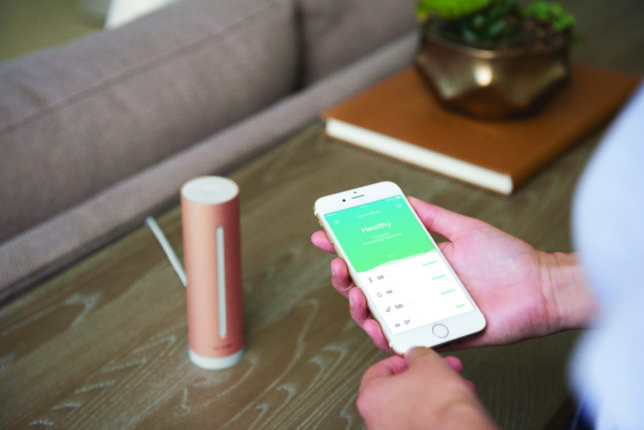
Some smart home solutions like Netatmo’s can helps improve the environment each day. Thanks to the Smart Indoor Air Quality Monitor you can monitor indoor air quality in real-time on your smartphone, track its changes over time and see the positive effects of your actions. As soon as the indoor air quality turns bad, you receive an alert on your smartphone, prompting you to immediately take the necessary actions to improve your home’s indoor air quality and purify your environment.
About the expert
 Fred Potter is a French engineer and entrepreneur. He is the founder of Netatmo, a smart home company that designs different solutions to improve wellness at home and to make daily life easier for everyone. Prior to founding Netatmo, Fred founded Cirpack in 1998, the telecommunications equipment supplier of the largest IP based telephony networks in the world. In 2008, Fred co-founded Withings, known for innovation in connected health devices. Fred graduated from Telecom ParisTech Engineering School and has a PhD in micro-electronics.
Fred Potter is a French engineer and entrepreneur. He is the founder of Netatmo, a smart home company that designs different solutions to improve wellness at home and to make daily life easier for everyone. Prior to founding Netatmo, Fred founded Cirpack in 1998, the telecommunications equipment supplier of the largest IP based telephony networks in the world. In 2008, Fred co-founded Withings, known for innovation in connected health devices. Fred graduated from Telecom ParisTech Engineering School and has a PhD in micro-electronics.
Dr Leah Austin, GP, nutritionist and expert advisor to NuroKor, commented:
“Over the past 12 months, we have seen a huge shift in the way consumer’s approach their health and wellness. Driven largely by necessity as a direct result of the pandemic, many people have been unable to access health and wellbeing services as freely, or in the same ways as they used to; meaning there has been a huge surge in demand for at-home treatments, solutions and products that can help protect our health both physically and mentally.
“One of the biggest trends I expect to grow throughout 2021 is a rise in the use of health technology solutions that can be used directly by patients, in their own homes, without the need for intervention or application by a medical professional. Understandably, lots of people suffering with chronic and ongoing health issues still feel very concerned about physically seeing their GPs or healthcare teams, so having access to tools that can treat or manage their conditions at home has the potential to be life-changing.

“Bioelectronics, for instance, is one area of health tech that is growing rapidly – in fact, the global bioelectronics industry value is tipped to reach USD $25 billion by 2023. I’ve seen firsthand how it can make a huge difference to people suffering from acute and chronic pain. Wearable devices, like those produced by NuroKor for example, use bioelectric nerve, muscle and microcurrent stimulation to help manage pain and optimise physical performance for patients suffering from a wide range of conditions. This kind of tech is also small, portable and non-invasive so it means it can be used anywhere, at any time and removes the need for potentially harmful pain-killers and other forms of medication.
“Another key area that’s set to grow massively is remote and virtual mental health services. There’s absolutely no denying that the pandemic has taken its toll on a lot of people. For some it has brought on bouts of anxiety and stress that they have never experienced before, and for others it is exacerbating the mental health conditions that they were living with pre-Covid.
“It’s absolutely critical that people do not stop or reduce the frequency at which they receive support and treatment for their mental health simply because they aren’t able to access them in the same way they were before the pandemic. Options like video or telephone counselling sessions, offered through services like NHS TalkWorks, or even apps that support day-to-day coping mechanisms like WorryTree or Calm – will certainly become lifelines for many Brits.”
Hilde Hjertholm, physiotherapist and NuroKor Norway CEO, commented:
“One of the biggest – and most important – changes we have faced in terms of our health and wellness in recent months, is how we exercise. As we have moved back and forth between varying degrees of lockdown and gyms, sports centres and fitness studios have remained closed for months at a time, lots of people are turning to home exercise as a means of keeping fit.
“It’s estimated that home workout equipment sales have risen by a staggering 5,800% this year and you only need to go for a quick walk on your lunch break to notice how many others are out and about running, cycling and walking.
“Even though the UK now has a roadmap for ending lockdown and reopening gyms and fitness facilities, I anticipate many Brits will continue to stick with their home workout routines, and invest more into smart tech and fitness equipment rather than fork out for gym memberships. Brands like Peloton and NordicTrack are rapidly growing in popularity – particularly as they allow members to connect with a wider community, so you still get the same interaction and motivation that you would in a fitness class, but from the comfort of your own home.

“The “Strava-effect” is also one of the biggest things to come out of lockdown in terms of our health and fitness. People are becoming obsessed with tracking their exercise, hitting their daily step count and of course, keeping an eye on what other people are doing. The wearable fitness tracker market is growing significantly – whether it is watches like Garmins and FitBits or Bluetooth exercise vests, running pods and ‘smart rings’.
“However, while it’s no doubt a good thing that so many of us are doing everything we can to remain fit and healthy, despite the hurdles Coronavirus has thrown at us, it’s not without its challenges. Going it alone means the risk of injury becomes much higher – particularly for those who don’t normally exercise as frequently or are adjusting to new ways of exercise and different equipment.
“A big area I anticipate will grow this year is the use of electroceutical or bioelectronic therapies – which is a relatively new category of therapeutic agents which act by targeting the neural circuits of organs. Electroceutical therapy is highly effective in managing pain – particularly pain caused by sporting injuries – and does so by using bio-electrical currents to target nerve endings through the skin, which then limits pain signals reaching the brain.
“Technology like the mibody, produced by bioelectronics specialist NuroKor, is a real game-changer. It means that anybody suffering with a sports injury or ongoing aches and pains can manage and treat it from their own home, without the need to see a doctor or physiotherapist. Not only does it help with pain management, but it is also proven to optimise recovery times and enhance overall physical performance – helping to future proof our fitness for longer.”
About the experts
Dr Leah Austin is a practising GP & Nutritionist with an interest in biotech. She invested in NuroKor after seeing its huge potential in treating patients with chronic and acute pain, particularly in helping patients reduce reliance on over-the-counter medications and pain killers that have potentially harmful side effects.
Hilde Hjertholm is a Physiotherapist and CEO of NuroKor Norway. As a trained physiotherapist, Hilde is interested in how bioelectronic therapy can help our body, muscles and joints repair limiting the potential for long-term damage and injury and support our overall physical performance. Hilde works with a range of clients – from normal people to elite athletes so knows first-hand how bioelectronics can be used to support specific problems.
]]>